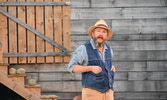By Lisa Boonstoppel-Pot
I laughed out loud (more than once) watching The Farm Show: Then and Now on the Harvest stage in Blyth.
I didn’t see the original Farm Show play but director Gil Garratt and cast incorporated its history and success right into the play.
In fact, there were three levels (sometimes happening simultaneously) during this play: 1. A reenactment of scenes from the original. 2. A retelling of why the play was written in the first place and its subsequent, world-wide success. 3. A tribute to the original actors, living and dead in present day voice to honour their legacy. That, along with all the vignettes of farming stories in Huron County could have become chaos.
Instead, it pushed and pulled in all the right places, which will earn the play and cast a new generation of fans while simultaneously creating a nostalgic bond with anyone who A) watched the original play B) knows the Tebbutts, Crawfords and Lobbs represented in the play and C) farms themselves.
This is where the play really hit home for me, particularly the hay mow scene where an “actor playing an actor who played a farmer 25 years ago” (a line from the play) relived his experience unloading and stacking hay for the first time.
From his first emphasis on the new word he had learned – “mow”, I was hooked. Right there with the crowd as we all shook our heads at the stupidity of wearing shorts doing hay. “Had to be from Toronto,” we were thinking and yes, he was.
The actor playing an actor playing a farmer talking about how awful it was unloading the hay wagon so he decided to go into the mow. Again, any of us who have ever worked in a mow were thinking, “wrong choice, fella.”
Actor Landon Doak had a knack for physical humour (you’re going to watch him portray a deer in another scene) and everything he did made me think “fool” while also admiring his tenacity.
Filling a mow is HARD WORK and what he did best was honour every farmer who has stoically sweated through wagon after wagon of dusty, heavy hay bales.
When Doak said after the first load he discovered the greatest thing in the world, I was already mouthing “Freshie” when he yelled it from the stage.
Another of Doak’s lines after standing in sweaty exhaustion in the mow was to ask “why would any human being put themselves through such utter hell. I didn’t understand it then and I don’t understand it now.”
I think I do because I was one of them. Growing up on a dairy farm, the oldest of three, I spent many summers unloading hay wagons because round and square balers weren’t part of the package. Those summers were both the worst and best times of my life. It was brutal work but the pride of a full mow and the satisfaction of knowing you had feed for the whole winter combined with creating serious muscles! I credit today’s physical strength and fitness to a childhood of good old-fashioned hard work.
I learned to stack a mow from my dad, who was as fit and strong a man as you ever met. Those mows stood straight all winter as we dismantled them bale by bale to feed the cows.
Dad didn’t always like it when we made forts but we did, having friends over on Sundays to add rooms and eat Fruit Loops in their dark, cavernous insides.
I’m a daughter of Dutch immigrants so I wasn’t part of the play’s family base but of course I know the Lobbs and their “dynasty” on the 16th line (a song from the play that will ring in your head long after the play).
Still, I felt honoured because I was and am a farmer with a history from a similar time period the original Farm Show was created. The creative team and ensemble cast who brought this play back to life took our history, our neighborliness, our faith, our persistence and determination and made it into a story that will live on and be shared again and again.
Kudos and bless your hearts, actors, for being chickens, tractors, snowmobiles, winter, peacocks, deer and “actors playing actors who played farmers 25 years ago”. Especially to Garratt for his original announcement of “intermission” in rooster speak.
You did us proud and it was a good laugh to boot. ◊


